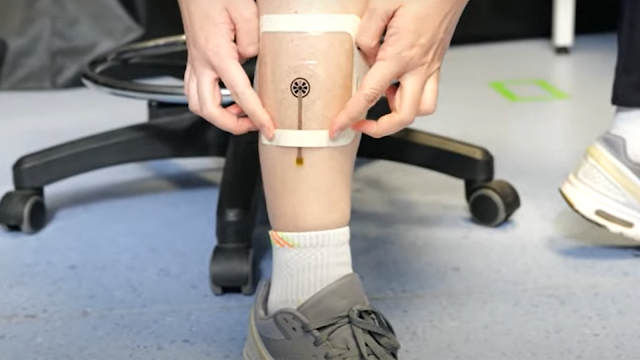656
 |
| Image credit: National University of Singapore/ YouTube |
In research conducted at the National University of Singapore (NUS), scientists have invented a smart bandage that contains wearable sensors and can monitor chronic wounds wirelessly through an app.
Chronic wounds are those wounds that do not follow the normal timelines of healing as well as the repairing process. Bleeding can occur randomly in these wounds, which also show changes in their pH level as an outcome of infection. Additionally, external pressure, trauma, inflammatory factors also affect these wounds which can lead to severe pain, stress, and discomfort. (Also read about the role of chitin in healing chronic wounds)
The treatment and diagnosis of a chronic wound are challenging as the healthcare provider has to rely on physical inspections and visual examinations, to monitor the growth of the wound. This method is also troublesome for the patient as s/he has to visit the hospital multiple times, making it a time-consuming and expensive exercise. Estimates suggest about 2.5% of the U.S.population suffers from such wounds including chronic venous leg ulcers and diabetic foot.
For patients with diabetic foot ulcers, these wounds can end up with serious complications needing interventions like amputation (surgical removal of the foot). However, this could change with smart bandages as healthcare providers would be able to inspect these wounds regularly and remotely.
Developed by researchers at NUS, these bandages can recognize the early signs of chronic wounds such as pH variations, bleeding, external pressures, etc. This simple bandage can send progression data and issue warnings to the patients along with their medical staff, to determine the requirement of changing the dressing.
Working of Smart Bandages
Clinical assessment of wounds relies on traditional medical tests that include visual inspection, collecting, and sending fluid samples to labs for detecting infection. This is usually done by measuring certain components called biomarkers and takes about two to three days to complete.
As an alternative to these processes, the researchers developed a point-of-care wound assessment platform, VeCare that consists of an advanced wound sensing bandage, a mobile app, and an electronic chip. VeCare can detect the bacterial type and probes inflammatory factors, along with biomarkers such as acidity and temperature in 15 minutes. The bandage consists of a wound contact layer, a flexible immunosensor, a breathable outer barrier, and a microfluidic wound fluid collector.
The immunosensor uses an electrochemical system to detect specific biomarkers in the wound fluid that can lead to chronic wounds. The function of a microfluidic wound fluid collector involves directing and boosting fluid delivery to the sensor. It increases the fluid delivery efficiency up to 180%.
A flexible electronic chip connected to the sensor transfers the data of wound progression on the app for convenient analysis. The chip comes with a rechargeable battery so it can be reused for further applications. In addition, the efficiency of the bandage doesn’t get affected by its design. It can be used irrespective of the shape and size of the wound.
Sensors Allow Easy Wound Management
The technology allows medical professionals to analyse the wounds of the patients remotely. With this, patients can get timely treatment for wound healing without visiting hospitals regularly.
“Point-of-care devices coupled with digital health capability can play an important role in revolutionising the healthcare industry and our society which is catalysed by COVID-19 pandemic requirements for safe distancing. Our smart bandage technology is the first of its kind designed for chronic wound management to give the patients the freedom to perform the test and monitor their wound conditions at home,” said Lim Chwee Teck, a biomedical engineer at NUS.
The research team is currently working on regulatory, safety, and mass-production aspects of the technology. The team is set to explore other biomarkers for different wounds and use data in the current experiments to provide advanced treatment and diagnostic options.
Details of how the harmful consequences of chronic wounds can be reduced by this smart bandage technology can be found in the full study Science Advances.

